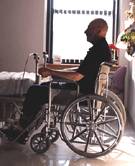
SATURDAY, Oct. 26 (HealthDay News) — People without social support may experience more pain years after surgery, a new study suggests.
Researchers surveyed 687 patients, average age 62, with rheumatoid arthritis or osteoarthritis who underwent total hip replacement surgery. Of those patients, 8.2 percent in the rheumatoid arthritis group and 7.8 percent in the osteoarthritis group were considered to be socially isolated.
This meant that they had few people who were close to them. For example, they were not married, had fewer than six friends or relatives, or did not belong to any community or religious groups.
The socially isolated patients were almost three times more likely than those with good social support to have serious, ongoing pain two or more years after having hip replacement surgery, according to the researchers at the Hospital for Special Surgery in New York City.
The study is scheduled to be presented Tuesday at the annual meeting of the American College of Rheumatology in San Diego. Research presented at meetings should be considered preliminary until published in a peer-reviewed medical journal.
“We believe further prospective studies should be done to determine whether interventions to evaluate and improve patients’ social ties before surgery could lead to a better pain outcome after hip replacement,” study author Dr. Lisa Mandl said in a hospital news release.
“It could be a way to improve outcomes without medication or other costly interventions. I see no downside to helping patients get the social support they may need to improve their quality of life,” Mandl said.
She noted that previous studies have shown that people with poor social ties are at higher risk for heart attack, stroke and death than those with the support of family, friends and the community.
More information
The American Academy of Orthopaedic Surgeons has more about hip replacement.
Copyright © 2026 HealthDay. All rights reserved.
